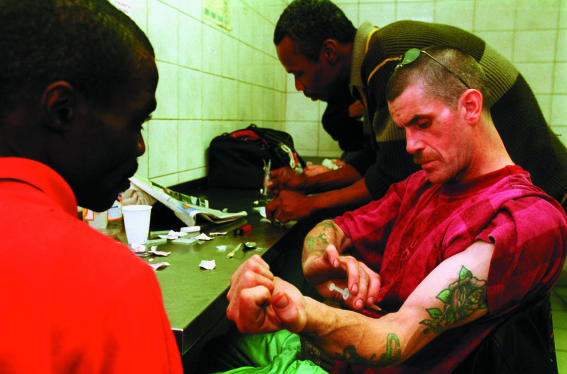The combined prescribing of heroin and methadone on medical grounds to long term users of heroin is safe and manageable and has health benefits over ordinary methadone programmes, two large randomised controlled trials in the Netherlands have concluded.
Prescribing heroin to up to 2000 addicts for whom no other medical treatment has proved effective now looks likely.
The trials were carried out on 549 patients in six cities between 1998 and 2001 by the Central Committee on the Treatment of Heroin Addicts. The committee was set up by the Dutch health minister in 1996 to look at the intended and unintended effects of medical prescription of heroin to “chronic, therapy resistant addicts” (BMJ 1995;310:1625).
Patients in one group were prescribed heroin and methadone for six or 12 months, while a control group received only methadone. The effect of discontinuing heroin treatment was also investigated.
Patients who were prescribed heroin and methadone experienced 23-25% more “clinically relevant improvements” in their physical, mental, or social condition than patients taking methadone alone. The improvements included better social contacts, less criminality, and less use of cocaine—90% of all the patients had previously been heavy users of cocaine.
The follow up study showed that within two months of stopping the treatment more than 80% of the patients lost all health gains.
The studies also conclude that prescribing heroin can be safe. Three patients died during the studies, which involved the dispensing of heroin 140 000 times. This is less than half the death rate in methadone programmes.
The committee now recommends that combined heroin and methadone treatment, under strict conditions and as a last medical option, should be introduced as part of Dutch addiction care and that the registration of heroin as a medicine should be promoted and a “quality system” developed for prescribing the drug.
Health minister Els Borst will put the recommendations to parliament, where MPs are expected to support them. She is keen to base policy on evidence, not ideology, and praised the research for its “unique” scientific framework.
The average patient in the studies was 39 years old with a 16 year addiction. The heroin was dispensed at a clinic three times a day for smoking or injecting under medical supervision, enabling close contact between patients and medical staff.
Of an estimated 25 000 people in the Netherlands with a heroin addiction, 13 000 are treated on methadone programmes—but for 8000 of these methadone treatment is deemed ineffective, because of criminality and use of other drugs.
The results of the trial can be accessed on the committee's website at www.ccbh.nl
Figure.
HOLLANDSE HOOGLE/PANOS
Dutch addicts may soon get heroin prescribed



